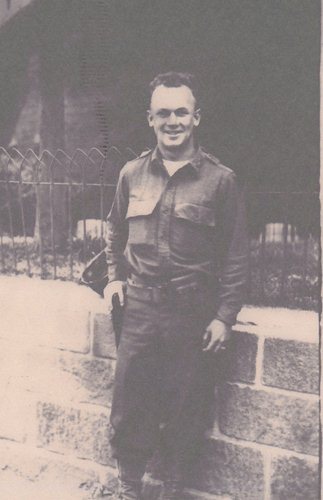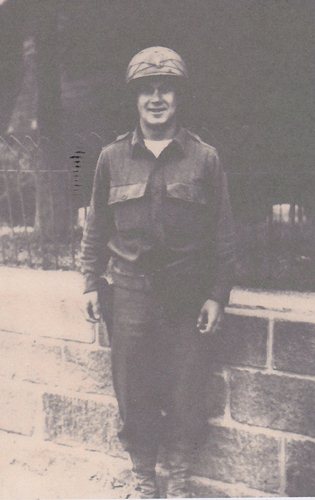Captain Robert Charles "Bob" Brower Jr., was an Intelligence Officer with the 83rd from their very first days at Camp Atterbury in 1942 until mustered out at Christmas 1945.
His military service began when he bacame 21 in April 1941 and was commissioned as Field Artillery Second Lieutenant in the Officer Reserve Corps. He had trained for four years in the senior ROTC unit at Culver Military Academy, with further training for six weeks at Fort Knox in the summer of 1937.
After Pearl Harbor, when he was in his senior year at Dartmouth, he was called to active duty, but was able to secure a deferment. This enabled him to study for and take his first semester exams in January and then prepare for and take special comprehensives in his history major in February.
On April 1, 1942, he reported for active duty at Fort Hayes, Ohio, and then was send to Fort Bragg, North Carolina, for six weeks, and then on to the Field Artillery School in Fort Sill, Oklahoma. There he recived his A.B. diploma by mail. No cap and gown, but he had graduated with his class.
In July 1942, he was to report to Camp Atterbury, Indiana, as a member of the cadre of the newly activated 83rd Infantry Division. He was assigned to the 908th Field Artillery Battalion (105mm Howitzer) which was the direct support arm of the 331st Infantry Regiment. Together they were part of what was called the 331st Combat Team. The 83rd Division was to built up to 18000 men trained for combat.
The recruits were draftees from all over the eastern United States and full strength was reached in November. In the winter of 1942 and spring of 1943 the 18000 new GI's received their basic training. During the summer of 1943, the 83rd Infantry Division went on maneuvers in Tennessee. In the following winter of 1943-1944 training was continued at Camp Breckingridge, Kentucky.
On April 6, 1944, Robert's unit sailed for England from Staten Island, New York, on the army transport ship George Washington. The ship had been the German luxury liner Kaiser Wilhelm before being interned by the U.S. in New York harbor when entering World War One in 1917. The transport officers quarters were eight to a cabin, the enlisted men were in racks in the former steerage.
Robert Brower landed at Liverpool, England on April 20, 1944 after going north of Ireland to avoid German U-boats. The Division then camped in the vicinity of Chester while the 908th drew his arms and equipment from the many supply areas the U.S. Army had set up throughout central England. The 908th FA then went to Wales to test-fire their artillery and prepare for combat.
The 83rd Division embarked from a Channel port on June 18, D-Day+12, but had to lie at anchor for three days off Omaha Beach because of a storm. Finally, Robert landed on Omaha Beach on June 22, 1944 and moved inland to the vicinity of Carantan to relieve the 101st Airborne Division that parachuted in on D-Day. They were now in hedgerow country, small fields and orchards surrounded by walls made of earth, hedges and trees.
Robert was digging in along one of the hedgerows when he met his first Frenchman. The local walked up to him across the field past seven or eight of his cows dead and belly up, probably killed by the naval bombardment on D-Day and offered Robert and his comrades a drink from a jug, saying "Voulez-vous Calvados?" (Do you want a Calvados). That was Robert's introduction to the famous French drink made from apples and similar to the homefront apple jack. He offered a small glass but that one shot was plenty!
When the action began, Robert Brower was a First Lieutenant and became a liaison officer on a rotating basis. They were holding positions until July 4, 1944, when the 83rd Division went on the offensive. The Division took three weeks to get to the Taute River and Lavard Penninsula, a distance of seven miles. They were fighting some of Hitler's best, the 17th SS Division and the 6th Parachute Regiment. In the middle of July, Robert was moving forward with the 2nd Battalion of the 331th Regiment on a dirt road when they saw a German ME109 begin a strafing run on them. On his tail was an American P-47. The German was firing at the US troops and the Amirican was firing at him and all of their machine-gun bullets were hitting the road and advancing at them. Robert and his buddies hit the ditches and suffered very few casualities. Afterwards they had the satisfaction of seeing the P-47 shoot the German plane down.
While with an advance party moving toward Brittany around August 4, 1944, Robert saw Patton for the first and only time. He was at a road junction near Avranches. Patton drove up in a Jeep and yelled: "Hey you guys! Is this the road to Avranches?" The guys assured him he was on the right road and Robert said to hisself: "So that was old Blood and Guts. With a high-pitch voice like that, no wonder he tries to act so tough in front of his men."
It was during the fighting for Dinard that Robert's artillery battalion, the 908th FA, suffered its greatest losses. German artillery killed the Battalion Commander and three others, seriously wouning 11 more GI's. The day before 908th FA commander, Lieutenant Colonel Thompson, was killed, he awarded Robert Brower a battlefield promotion to Captain and named him to hiss staff as the Battalion Intelligence Officer, a job that Robert performed for the rest of the war. His duties when they were advancing were to go with the forward elements and select positions for firing batteries, headquarters battery and service battery. When he was in action supporting the infantry whit there fire, he worked in the battalion fire-direction center supervising the work of there forward-observer parties, mostly by radio contact.
From August 20, 1944 to he middle of September the 908th FA mission was to protect the right flank of the Third Army as it swept eastward. The 908th FA bottled up 60000 Germans in the submarine bases at St. Nazaire. From ther, they extended 200 miles past Nantes, Angiers and Orleans.
|
|
Robert "Bob" Brower in Nantes, Brittany, France, in August 1944 |
In late September, the 908th FA moved 300 miles eastward into Luxembourg with the mission of driving the Germans across the Moselle River and bihind the Siegfried Line in Germany. This was accomplished, and they then patrolled the Moselle for two months.
On December 3, 1944, the 83rd Division was transferred out of the 3rd Army into the 7th Corps, 1st Army, and ordered into the Huertgen Forest battle. They moved north from Luxembourg to relieve the 4th Division and there the objective was to reach the Roer River. By December 20, 1944, the Roer was reached near Gürzenich, but at a terrible cost of 1951 battle casualties, including 589 dead.
Living and fighting in a forest had hazards not before encountered. German artillery shells would explode in the trees, raining dawn deadly shell fragments on the GI's below. Digging in for protection was not possible because of the high water table. As protection, they cut down threes to build shelters over their heads. One night, Bob pitched his tent over his bed roll for warmth, but soon left it for one of the log shelters when German shelling commenced. The next morning, Bob got back to his tent and found holes through it and the bed roll from shell fragments. Bob was sure thankful that he had moved.
More than 33000 Allied forces were killed or injured in the Battle of the Huertgen Forest.
After the German breakthrough on December 16, 1944, the 908th FA was put under the command of British Field Marshall Bernard Law Montgomery. On December 25, 1944, he ordered them to disengage and race west into Belgium to hit the Bulge at its tip from the north. Twenty-four hours later, they were engaging the Germans 75 miles from the Roer at Rochefort, Ardennes, Belgium.
The weather, however, presented new problems. The snowstorms began, and for two weeks they were fighting in Arctic conditions, whithout proper clothing and footgear. Trench foot and frostbite were the main cause of casualties, and far exceeded the battlefield wounds. On January 17, 1945, the 908th FA crossed the Croutel-Houffalize highway, and their part of the battle was finished.
The Third Armored Division then took off down the highway.
For much of February, they rested and retrained the reinforcements who were arriving to replace those lost in the Huertgen Forest and the Battle of the Bulge. The 83rd was then assigned to the XIX Corps of the 9th Army.
February 22-23, 1945, they crossed the Roer River and began their advance to the Rhine. On March 2, 1945, the 331st Combat Team became the first Allied troops to reach the lower Rhine.
Duuseldorf was across the Rhine and Bob's 908th Field Artillery Battalion fired the first shots into that city. No crossings were possible since all the bridges had been blown up. The 83rd was ordered back into Belgium and Holland to train for river crossing. Before the end of March, all Allied troops had reached the Rhine and units of the Third Army had seized a bridge intact at Remagen and made the first crossing.
On Bob's 25th birthday, April 13, 1945, they crossed the Elbe River south of Magdeburg at Barby. The next day they established a bridgehead east of the Elbe. The 83rd named their bridge the Truman Bridge in honor of their new president. They where now 60 miles from Berlin. Soon after, they made contact with the Russians, who where advancing from the East, and the war in Europe was over for Bob.
After a short stay in Brunswick, wich became part of the British occupation zone, Bob moved to Bavaria. Division headquarters was in Passau. Bob's battalion was headquartered in Hauzenberg, a small village in the hills, just a few miles from the Czechslovak border, wich was occupated by the Russian. As Battalion Intelligence Officer, Robert "Bob" Brower's job was to organize a border patrol. They secured horses from local farmers, mounted them with their own country boys, and established their patrol. Their main problem was handling drunk Russian soldiers who came across the border to loot the Germans. They would load them into their trucks and ship them of to their Division MP's in Passau.
In June, Bob was sent to a Japanese army "order of battle school" to learn their organization and tactics. This made Bob realize that they could next get on a boat and head for war in the Pacific. While they were there, the atom bombs were dropped and Japan surendered. Three day later, orders came down to discontinue the exercises. Robert Brower now knew that World War Two was over for him.
They were deactivated in Austria and spent tree days in 40-and-8, a railroad boxcar capable of holding 40 men or eight horses, to get to a French port. Robert sailed home on a freighter Victory Ship and landed in New York. He was met his parents at the train station in Canton, Ohio, in November 1945. He remained home until February 1946.
Robert Brower's post war career in sales and management spanned two industries. First a fibrous glass manufacturing (Owens Corning, Gustin-Bacon) and second, a paper manufacturing (Honeycomb Division of Union Camp Corporation).
With his wife Lucille, Bob raised two childeren, Bonnie and David. Bob now lives with his second wife Gladys in Richmond Virginia.
Today, November 6, 2012, when I write down Bob's story, he is still doing very well at age 92.

